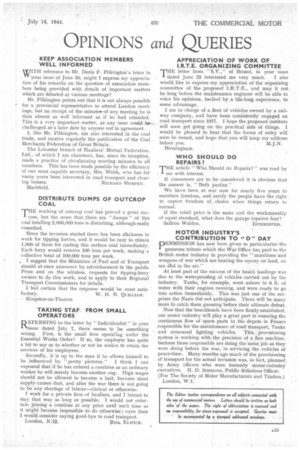OPINIONS and QUERIES
Page 35

If you've noticed an error in this article please click here to report it so we can fix it.
, KEEP" ASSOCIATION MEMBERS WELL INFORMED WITH reference to Mr. Denis F. Pilkington's letter in " your issue of June 30, might I express my appreciation of his remarks on the question of association members being provided with details of important matters which are debated at various meetings?
Mr. Pilkington points out that it is not always possible for a provincial representative to attend London meetings, but on receipt of the minutes-of any Meeting he is then almost as well informed as if he had attended. This is a very important matter, as any issue could las challenged at a later date by anyone not' in agreement.
I, like Mr. Pilkington, am also interested in the coal trade, and receive regularly the publication of the Coal Merchants Federation of Great Britain.
• The Leicester hranch of Hauliers' Mutual Federation, Ltd., of which I am chairman, has, since its inception, made a practice of circularizing meeting minutes to all members. This has been made possible by the efficiency of our most capable secretary, Mrs. Webb, who has for many years been interested in road transport and clear ing houses. RICHARD IVIT_IRYHY, Markfield.
DISTRIBUTE DUMPS OF OUTCROP COAL
THE working of outcrop coal has proved a great success, but the news that ;there are " dumps " of this coal totalling 2,000,000 tons is disturbing, although easily remedied.
Since the invasion started there has been slackness in work for tipping lorries, and it would be easy to obtain 1,000 of them for carting this surface coal immediately. Each lorry would remove 100 tons per week, making a collective total of 100,000 tons per week.
• I suggest that the Ministries of Fuel and of Transport should at once announce by advertisement in the public Press and on the wireless, requests for tipping-lorry owners to do this work, and to apply to their Regional Transport Commissioners for details.
I feel certain that the response would be most satis
factory. W. H. B. QUILLIAM. Kingston-on-Thames.
TAKING STAF. FROM SMALL OPERATORS
REFERRING to the letter by " Individualist " in your issue dated July 7, there seems to be something wrong. First, is the small firm operatllig under the Essential Works Order? If so, the employer has quite a bit to say as to whether or not he wishes to retain the services of his employees.
Secondly, it is up to the man if he allows himself to be influenced by "pretty pictures." I think I can expound that if he has entered a combine as an ordinary worker he will merely become another cog. High wages should not be allowed to become a bait, because short supply.causes that, and after the war there is not going to be any shortage of labour—clerical or otherwise.
I work for a private firm of hauliers, and I intend to stay that way as long as possible. I would not. entertain joining a combine at any price until such time as it might become impossible to do otherwise; even then I would consider saying good-bye to road transport.
London, N.12. ItEG, ELWICK.
APPRECIATION OF WORK OF I.R.T.E. ORGANIZING COMMIITEE THE letter from " S.V.," of Bristol, in your issue I dated June 23 interested me very much. I also would like to express my appreciation of the organizing committee of the proposed I.R.T.E,, and may it not be long before the maintenance engineer will be able to voice his opinions, backed by ,a. life-long experience, to some advantage.
I am in charge of a fleet of vehicles owned by a rail way company, and have been consistently engaged on road transport since 1917. I hope the proposed institute will soon get going on the practical side of things. I would be pleased to hear that the forms of entry will soon be issued, and hope that you will keep my address before you. M. J . N. Birmingham.
WHO SHOULD DO REPAIRS?
THE article "Who Should do Repairs?" was read by
me with interest.
If consumers are to be considered it is obvious that the answer is, "Both parties.'' We have been at war now for nearly five years to maintain freedom, and surely the people have the right to expect freedom of choice when things return to normal.
If the retail price is the same and the workmanship of equal standard, what does the garage repairer fear?
Saffron Walden. INTERESTED.
MOTOR INDUSTRY'S CONTRIBUTION TO " D " DAY
PERMISSION has now been given to particularize the generous tribute which the War Office has, paid to the British motor industry in providing the munitions and weapons of war which are beating the enemy on land, on sea aId in the air."
At least part of the success of the beich landings was due to the waterproofing of vehicles carried out by the industry. Tanks, for example, went ashore in 6 ft. of water with their engines running, and were ready to go into action immediately. This was just one of the surprises the Nazis did not anticipate, There will be many more io catch them guessing before their ultimate defeat.
Now that the beachheads have been firmly established, our motor industry will play a great part in ensuring the continuous flow of spare parts to the depots in France responsible for the maintenance of road transport, Tanks and armoured fighting vehicles. This provisioning system is working with the precision of a fine machine, because those.responsible are doing the same job as they were doing before the war, in servicing the vehicles of peace-time. Many months ago much of the provisioning of transport for the actual invasion was, in fact, planned by Army officers who were formerly motor-industry" executives. H. D. SIMMONS, Public Relations Officer. (For The Society of Motor Manufacturers and Traders.)
London, W.1.




















































